Poverty, People, and Perspective — My Very W&M Break
I spent the first Monday morning of my spring break standing around in a Maryland soup kitchen.
Let me explain. I had trained since October to understand the issue of poverty, hunger, and homelessness through Branch Out National. In January, my co-site leader and I received our team, educated them, and now here we were, tackling these all-important issues in the biggest soup kitchen in Maryland. I was the “bread server,” and it was my job to offer pieces of bread to the incoming guests. I was excited, but nervous.
Although I had learned much about the issue of poverty, even as I stood there it remained an abstract issue to me. I had never personally met someone who didn’t have a home; I had never personally seen the inside of a soup kitchen. I knew the facts and the figures to be sure, but I hadn’t experienced it. I hadn’t felt it. I’m ashamed to admit it, but even then poverty was very much something unfortunate that happened to other people, not to me. I didn’t know what to expect when the doors opened up to the growing lines outside.
I was nervously standing in place when John, an employee who had been helping our team earlier, walked up to me and a few others. Out of the blue he started telling us his story. He told us how he himself had struggled in the past with making ends meet, and how at times he had even found himself in those lines, waiting for a free meal that was too expensive otherwise. “That used to be me,” he said. “I used to be out in those lines.” And then John told us something, and then everything made sense.
He said, “Everybody is just one step away from something, either good or bad.”
And at that moment I knew I had been wrong the whole time, and everything I thought I understood about poverty was thrown out the window. It wasn’t an other people issue anymore; being poor could happen to anyone, even me, and could happen regardless of race, sex, or socioeconomic position. John’s words spoke to the potential for both good and bad in all of us. They painted the world not in black and white or “us” vs. “them,” but in shades of gray, a world in which we stand one step away from both material well-being and the lines outside that soup kitchen. I was floored, and my head was spinning as I stood waiting for the doors to open.
Shortly after, the doors opened and the guests streamed in. There were individuals, families, couples, men, women, the old, and the young. Some were wearing the latest fashion of coats, while others’ had large holes. Many were using their cell phones, many others interacted with each other, often walking across “the floor” to sit next to or simply chat with another guest they knew. Everywhere I looked I saw smiles and laughs, handshakes and hugs, gratefulness and hope.
As I walked around the crowd offering bread to each guest as they were seated, John’s words echoed in my head and I started seeing familiar faces all around me. The woman just sitting down at a table was my Mom. The teenager across the room listening to his iPod was one of my best friends at W&M. The couple laughing and enjoying their meal were my aunt and uncle, and their young children flinging food at each other were my cousins from back home. All of a sudden my interactions and conversations became much more meaningful. I found myself intently listening to their stories, laughing at their jokes, and sharing in their dreams. As the day continued, I realized that I wasn’t talking to “homeless people,” or “poor people” as I might have thought before. I was talking to people; maybe people without a home, or people with financial disadvantages, but very much people, no different from myself or anyone else I knew.
The week progressed, and our team traveled across Baltimore city, working at different women’s shelters, homeless shelters, and day care facilities each day. But I think we all took a little bit of what John said with us. I think after that first Monday our whole team understood that we weren’t just helping strangers anymore. We were helping our friends, our colleagues, our classmates, our brothers, our sisters, our mothers, and our fathers. We were helping people¸ and although they might not have known it, they were helping us be better, more understanding people too.
- All geared up for the soup kitchen!
- Putting desks together for a local after school program
- THE TEAM!
- A wicked fun dance party at Gallagher Services for People with Developmental Disabilities

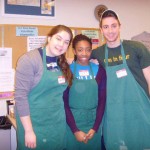
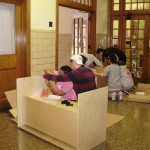
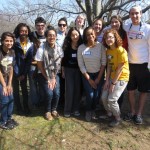
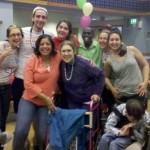
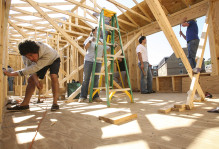
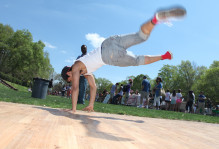
No comments.
Comments are currently closed. Comments are closed on all posts older than one year, and for those in our archive.